Triglav Via Ferrata
If you are an adventurer who loves breathtaking views and adrenaline, then climbing Triglav via Ferrata will be an unforgettable experience.
.webp&w=1920&q=75)
Quick links
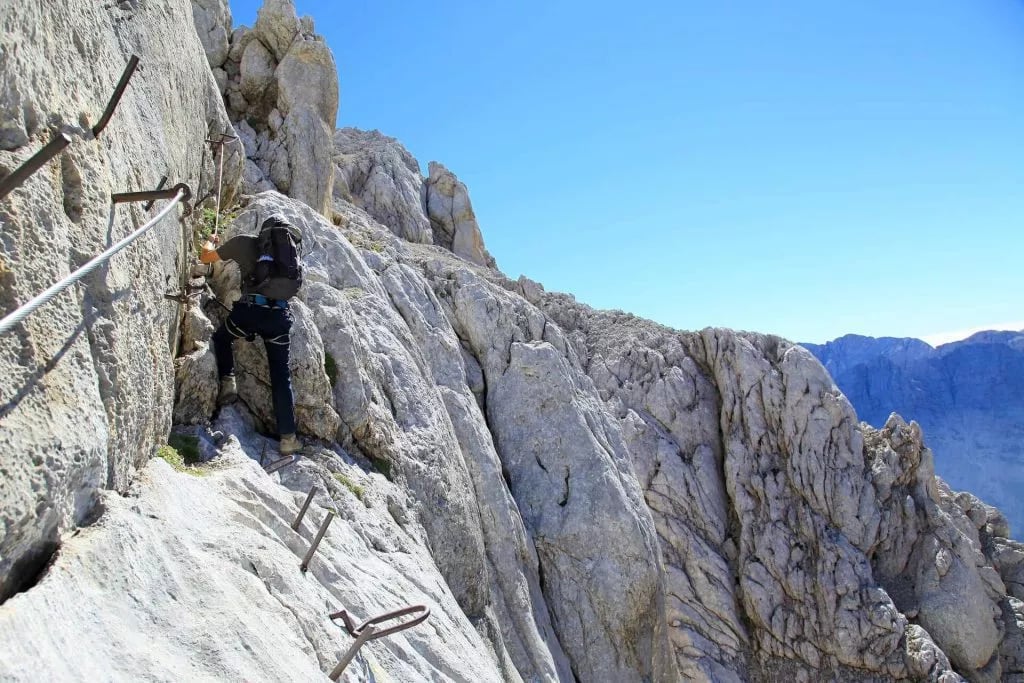
Relax and don’t worry because we have gathered all of the information for you in one place.
What is a Via Ferrata?
Via Ferrata is a protected climbing route, usually found in the Alps. A rough translation would be an “iron path” which refers to metal rungs, ladders, or permanently fixed safety wire as a means of crossing otherwise tricky and steep rocky terrain.

When did Via Ferrata become so popular?
Via Ferratas originated in Italy, more accurately in the Dolomites, during the first world war. The reason they were constructed was to help get men and equipment into strategic positions in the mountains. From the 1950’s they started to become more and more known and the name Via Ferrata started to describe the activity.
The real boom happened in the 1990s when they started to be constructed in France, Switzerland, and Slovenia.
Do I need to be a climber to take on Via Ferrata?
That depends on the difficulty of the route but in most cases, you don’t need any prior climbing experience for a Via Ferrata.
There are 6 different levels of difficulty, starting from the easiest marked as A, and the hardest, marked as F. You should always start with easier ones and gradually move on to the harder ones, depending on your strength, experience, and mobility.
But specifically for the Triglav via Ferrata, you don’t need any prior climbing experience, but it is important that you don’t have a fear of heights and are comfortable in a rocky environment because some parts of the route are not protected with the safety wire so you need to be able to have a safe step.
What kind of equipment do I need to climb a Via Ferrata?
For every Via Ferrata graded B or higher there are 4 mandatory pieces of equipment that you will require for the climb. The first one is a climbing harness that you will need for your protection. When buying one, be sure to pick the right size for you, so that it will not be too tight or too loose.
The second one is the via Ferrata set, in which you strap on the harness and then clip on the safety wire when climbing. Firstly we want to point out that homemade sets can be very dangerous because they don’t absorb the fall nearly as well as the professional ones and can lead to serious injuries or worse. The via Ferrata sets have two arms with carabiners for attaching to the cable, and an energy absorber section that takes the energy out of the fall.
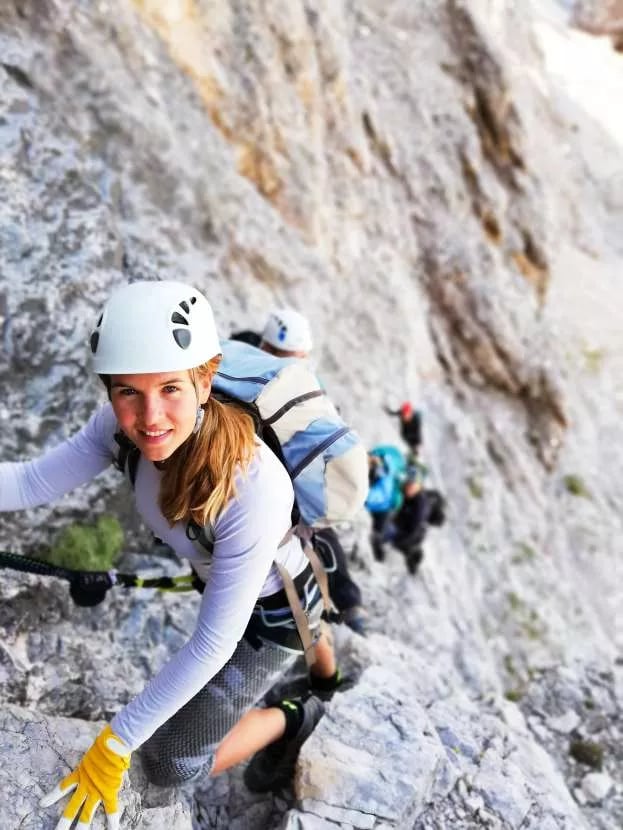
You also need a good climbing helmet, to protect you from any falling rocks and in case of a fall. Loose rocks are a real danger, especially in the high season, when you are climbing Triglav or another popular mountain and there are many people ahead of you.
A good pair of climbing gloves are necessary because they provide a much better grip and shelter your palms from cuts and scratches. You can choose between, half-finger, and closed gloves, although most climbers prefer closed gloves.
Where is the Via Ferrata on Triglav?
Because of the exposed summit that awaits you when climbing Triglav, the final part of the journey had to be secured with metal rungs and safety wire on all sides of the mountain, making every route a Via Ferrata.
Here is a list of the routes that you can take, depending on your experience, wishes, and physical fitness. Because all of the routes lead to the same destination a lot of them overlap at Planika mountain hut and the Triglav Lodge at Kredarica, so you have many different options when planning on climbing Triglav.
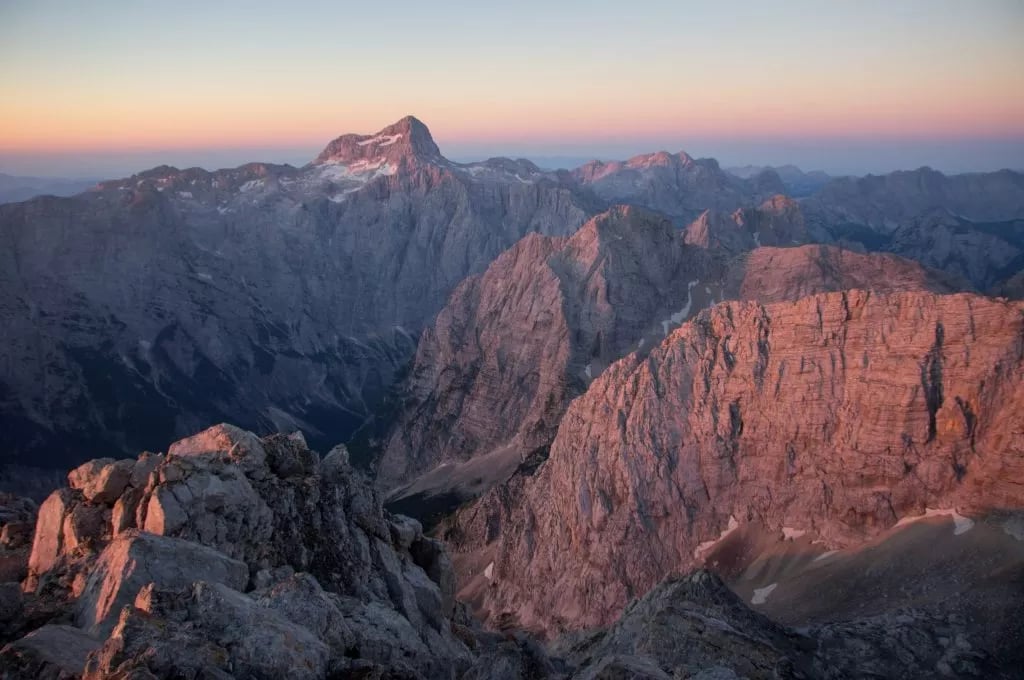
Triglavska Škrbina route
This route starts from the Krma Valley or the Pokljuka Plateau, depending on your preference. Like most of the routes to Triglav, the approximate walking time is about 6 hours from your car to the top. The hike starts slowly and you begin to gain altitude on undemanding terrain.

There you can rest your feet and fuel up for the final part of the summit – Triglav via Ferrata, which is technically the most demanding. After your stop, you will reach a crossroads with two options. You can go left and follow the Triglavska Škrbina route or go right and meet with the Ridge Route from Kredarica. The terrain gets steeper and you have to become more aware of your steps and surroundings.
For your safety in dangerous places, there are metal rungs and safety wire, on which you clip your carabiners from your Via Ferrata set. Soon you will start to see the top and catch a glimpse of the Aljaž tower that will welcome you to the top of Slovenia’s highest mountain.
Ridge route
Did you know there are actually two Triglavs? On the ridge route, you will also pass Mount Little Triglav, with an altitude of 2738 meters, located to the east of its big brother.

So lace up your shoes and prepare for climbing Triglav via Ferrata. Although the ridge is quite narrow and not for the faint-hearted, with proper experience and your via Ferrata set you are guaranteed to have a time of your life.
Tominškova route
Unlike the Triglavska Škrbina and the Ridge Route, through the Tominškova route, you will be climbing Triglav on the northern face of the mountain.
Like all of the routes that take you to the top on the northern face, you start in Vrata valley, a mountain valley above Mojstrana village. It is a very scenic route with some pretty amazing parts. One of them is the Triglavski Podi, with rocky terrain that will make you feel like you are summiting a mountain on the moon.
Along the way you can catch a glimpse of the remains of the Triglav glacier, once a magnificent structure where mountaineers could ski even in summer, but now practically non-existent because of global warming. You will have a chance to fuel up at the Triglav Lodge and then continue on the Ridge Route to the top.
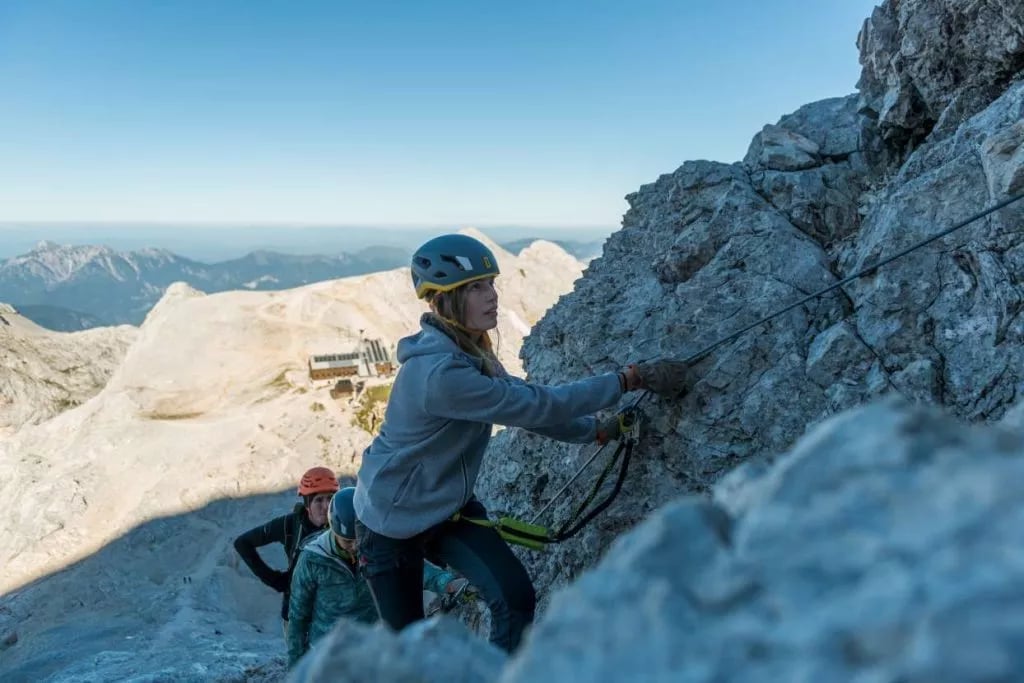
Prag route
Another route on the northern face of Triglav is the Prag Route. Regarding the difficulty of the climb, it is similar to the Tominškova route and they also have the same starting place. That is why many people take one of them for the ascent and the other for the descent, making the entire tour more interesting and fun.

Plemenice route
We saved the best for last. The famous Plemenice route is one of the most beautiful but at the same time one of the most demanding routes, not including the climbing routes in the north wall, when summiting Triglav.

And we have not even told you the best part. Just two years ago, it was thoroughly renewed and marked, making it a joy to climb it. Except for the last part, when you join the Triglavska Škrbina route, it is also less crowded than the others, so you will have more privacy when climbing Triglav. For the descent, most mountaineers usually choose the Tominškova or the Prag route, making it a spectacular circuit route.
You can view all the routes on the map here:
Can I climb Triglav in one day?
Although most hikers opt for a two-day ascent, it’s possible to do it in only one day. It is an amazing feeling to go to the highest peak in Slovenia and back down in only one day, but it requires good stamina and mental toughness.
It also requires some extra planning and choosing the most appropriate route, so if you are not sure, you can check out this amazing one-day guided tour.
When is the best time for climbing Triglav?
Although you can summit Triglav all year round, reaching the top in the winter months is much more challenging and reserved for skilled mountaineers with proper equipment and experience or for hikers under the guidance of an experienced mountain guide.
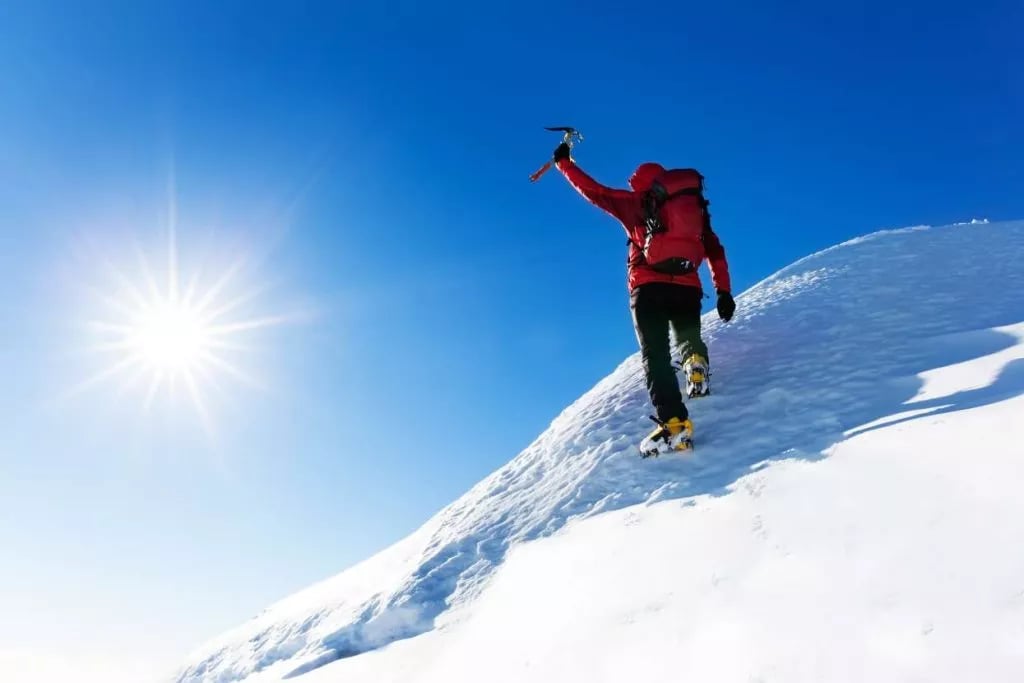
What can I do to safely climb Triglav via Ferrata?
There are a couple of things you can do to make sure climbing Triglav via Ferrata will be as safe as possible. Proper footwear and clothing, good knowledge of the route, regularly checking and understanding the weather forecast, and staying hydrated are the basic steps when climbing high mountains like Triglav.
And remember, if you are feeling too tired to continue, don’t push over your limits. In these cases you have to put your pride aside and prioritize your safety, the mountain will wait for you to give it another try when you will be ready.
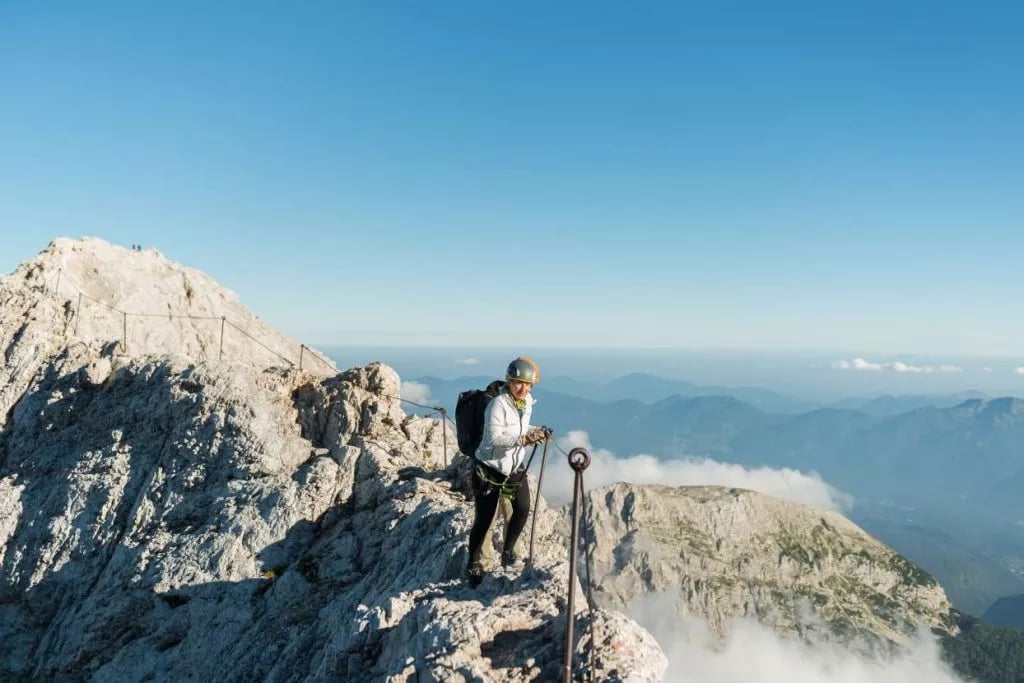
When reclipping your carabiners on the safety wire, make sure one carabiner is always clipped in so that in case you fall when reaching for the next part of the wire, you are still protected. In case a fall does happen, the via Ferrata set will stretch out to soften the fall. That way you have a softer landing but the via Ferrata set is destroyed in the process. Even if you have only a minor accident, it is best to have it checked out by an expert.
To avoid hurting climbers that are below you or getting hurt by the ones ahead, always have a safety distance between you. If these things are new to you and you don’t feel comfortable summiting Triglav alone, we recommend booking a 2-day guided hike.
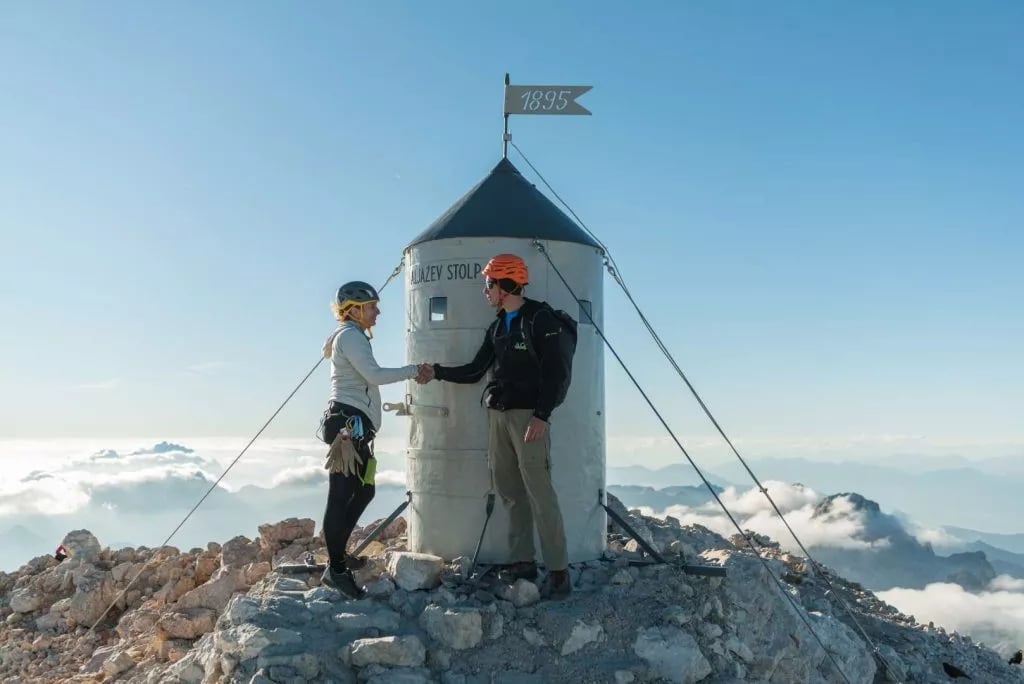
Why should I book a guided tour?
Climbing Triglav with a professional guide is always the safest and most enjoyable option. Besides the proper equipment, professional guides provide you with vital information regarding the best route to take depending on your fitness and experience and to do so under the right weather conditions.
On the via Ferrata part of the tour, the experienced guide will guard you with a safety rope attached to you, so with that and your via Ferrata set you will have double protection against a fall for maximum safety. Local guides are also fluent in English and can share some amazing insights about the mountains, the wildlife, the history of the place, and fun trivia.
Explore further, and learn more about Triglav tours and Triglav guides.

Expert Local Guides
Our professional guides know the local terrain and are trained to make this once-in-a-lifetime opportunity both safe and enjoyable.

Top Notch Equipment
We provide equipment rentals of helmets, harnesses, and more, by world-class quality brands.

Hassle-Free
We handle route planning, accommodations, transfers, and anything else you prefer not to deal with, so you can enjoy a carefree hike.

Trusted by Many
We are a financially protected company operating since 2014, and with thousands of satisfied customers in the past, we still put you first.

